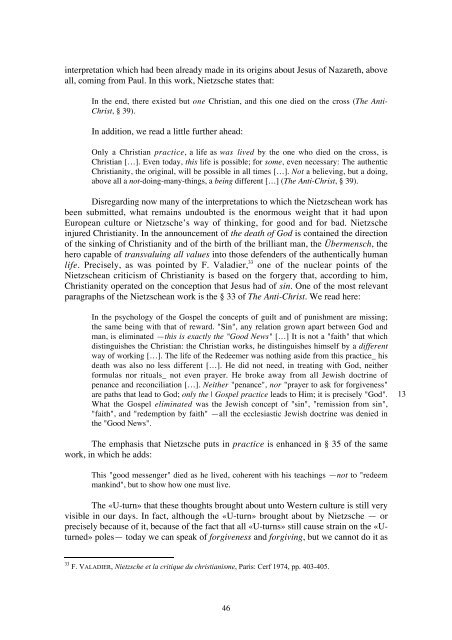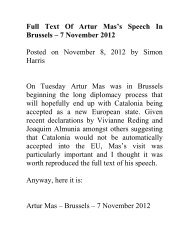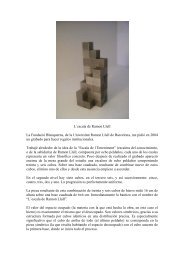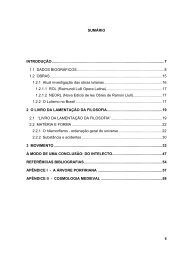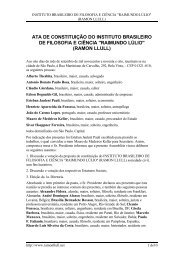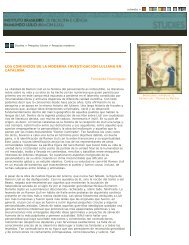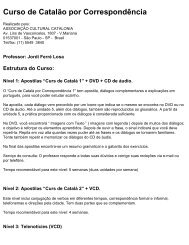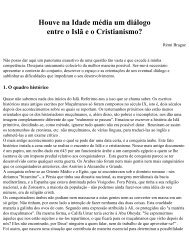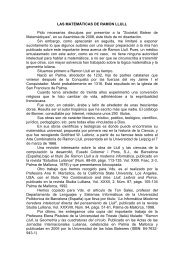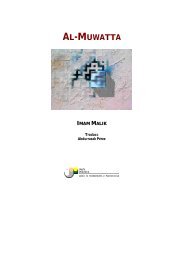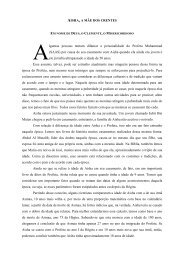Create successful ePaper yourself
Turn your PDF publications into a flip-book with our unique Google optimized e-Paper software.
interpretation which had been already made in its origins about Jesus of Nazareth, above<br />
all, coming from Paul. In this work, Nietzsche states that:<br />
In the end, there existed but one Christian, and this one died on the cross (The Anti-<br />
Christ, § 39).<br />
In addition, we read a little further ahead:<br />
Only a Christian practice, a life as was lived by the one who died on the cross, is<br />
Christian […]. Even today, this life is possible; for some, even necessary: The authentic<br />
Christianity, the original, will be possible in all times […]. Not a believing, but a doing,<br />
above all a not-doing-many-things, a being different […] (The Anti-Christ, § 39).<br />
Disregarding now many of the interpretations to which the Nietzschean work has<br />
been submitted, what remains undoubted is the enormous weight that it had upon<br />
European culture or Nietzsche’s way of thinking, for good and for bad. Nietzsche<br />
injured Christianity. In the announcement of the death of God is contained the direction<br />
of the sinking of Christianity and of the birth of the brilliant man, the Übermensch, the<br />
hero capable of transvaluing all values into those defenders of the authentically human<br />
life. Precisely, as was pointed by F. Valadier, 33 one of the nuclear points of the<br />
Nietzschean criticism of Christianity is based on the forgery that, according to him,<br />
Christianity operated on the conception that Jesus had of sin. One of the most relevant<br />
paragraphs of the Nietzschean work is the § 33 of The Anti-Christ. We read here:<br />
In the psychology of the Gospel the concepts of guilt and of punishment are missing;<br />
the same being with that of reward. "Sin", any relation grown apart between God and<br />
man, is eliminated —this is exactly the "Good News" […] It is not a "faith" that which<br />
distinguishes the Christian: the Christian works, he distinguishes himself by a different<br />
way of working […]. The life of the Redeemer was nothing aside from this practice_ his<br />
death was also no less different […]. He did not need, in treating with God, neither<br />
formulas nor rituals_ not even prayer. He broke away from all Jewish doctrine of<br />
penance and reconciliation […]. Neither "penance", nor "prayer to ask for forgiveness"<br />
are paths that lead to God; only the | Gospel practice leads to Him; it is precisely "God".<br />
What the Gospel eliminated was the Jewish concept of "sin", "remission from sin",<br />
"faith", and "redemption by faith" —all the ecclesiastic Jewish doctrine was denied in<br />
the "Good News".<br />
The emphasis that Nietzsche puts in practice is enhanced in § 35 of the same<br />
work, in which he adds:<br />
This "good messenger" died as he lived, coherent with his teachings —not to "redeem<br />
mankind", but to show how one must live.<br />
The «U-turn» that these thoughts brought about unto Western culture is still very<br />
visible in our days. In fact, although the «U-turn» brought about by Nietzsche — or<br />
precisely because of it, because of the fact that all «U-turns» still cause strain on the «Uturned»<br />
poles— today we can speak of forgiveness and forgiving, but we cannot do it as<br />
33 F. VALADIER, Nietzsche et la critique du christianisme, Paris: Cerf 1974, pp. 403-405.<br />
46<br />
13


